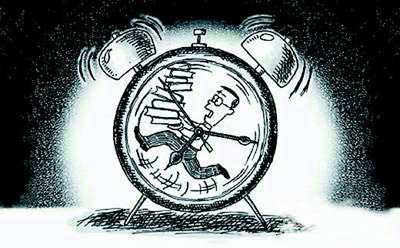Who is to blame?
Despite the stipulations in the Labor Law, taking a paid holiday instead of working for extra hours seems a luxury to a great number of white-collar workers. This is particularly true for private company workers. Only 60.1% of employees admitted their employers carry out the recess time in accordance with the law.
As to the 39.9% of companies that refuse to abide by the law, no substantial punishments or fines of any kind seems to fall on them, suggested the magazine.
Wang Xiaolu, an employee in an advertisement company in Beijing, recalled a "tearful experience" at the magazine. "There was one time when my boss announced after a meeting that anyone who wanted to take a day off, just text him," Wang said, only to find a few days later that all of her colleagues who sent the short message got fired.
The government's lack of action has been criticized by the afflicted group as a failed enforcement of the law. So far, China lacks a systematic law system to carry out the Labor Law or to regularly coordinate, supervise, and examine the work of protecting workers' rights. As a result, this has paralyzed the paid holiday provision. "Such violations of the law by the employers should receive severe punishment, if there were such rules formulated," said Insight China.
Gao Shunli, chief editor of China Tourism, attributed the problem to the lack of proper channels for employees to safeguard their rights. In addition, Gao blamed the lack of knowledge of workers in safeguarding their legal rights.
The unavailable paid leave has even prickled those lower-ranking government officials, though 98.2% of them claimed to enjoy the benefit.
Sun Zhe, who took a business trip the second day of his wedding, recounted his vexation with regard to his difficulties in applying for marriage leave: "My supervisor would be surprised if I actually handed over my application. No one has ever asked for it in my department."
This reflects one of the biggest obstacles for government officials to enjoy a paid holiday since most of the decisions are made by the supervisors, not the rules. It's thus impossible for the subordinates to take a holiday when the former don't voluntarily offer it.
All in all, only when the whole society starts to take the problem seriously and become aware of employees' legal rights to enjoy paid leave, will an improvement in such a problem come, commented the magazine.


















